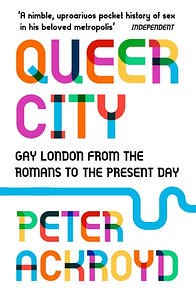Take a photo of a barcode or cover
challenging
dark
emotional
hopeful
informative
slow-paced
Unfortunately I enjoyed this a lot less than I had hoped, a little too much like a lot of facts strung together with no clear path and not enough like a clear thoughtful history.
Oh, such a shame. Seemed to run out of steam towards the end, racing through the 20th and 21st centuries; the time when so much social and political change has occurred.
Also, much of the book talks about stories and situations which are not exclusive to London, so why there is such emphasis on the 'Queer City' I'm not so sure. This is as much a history of sexuality in Britain as it is for London - albeit a very brief, whistle-stop tour of our history.
Also, much of the book talks about stories and situations which are not exclusive to London, so why there is such emphasis on the 'Queer City' I'm not so sure. This is as much a history of sexuality in Britain as it is for London - albeit a very brief, whistle-stop tour of our history.
As a gay history nerd, I enjoyed learning about queer history in London, but I found this book faltered in a few key ways. While the book did discuss "cross dressers" throughout London's history, they weren't talked about in terms of gender identity, with a focus on sexuality. Gender is presented very firmly as a male/female binary until a few sentences at the end, and the explicit discussion of trans people really only gets a few sentences throughout and a few paragraphs at the end of the last chapter. The last chapter was particularly disappointing - after such interesting deep dives into history from the Romans to 1900, the 20th and 21st centuries get very little coverage. The coverage that is given is frustrating as it seems to think all queer struggle is over now that marriage is legal, and even laments over modern discussions of privilege, which was exasperating. I think this book may have been better if Ackroyd stuck to more distant history and included more analysis and structure there than trying to shove in a relatively sorry chapter about the 20th-21st centuries.
informative
reflective
fast-paced
informative
reflective
fast-paced
I admit I expected more from Ackroyd and was looking forward to read this book. It's definitely informative, but considering that it covers 2000 years in 200-something pages, don't expect it to tell you everything in detail. Ackroyd focuses too much on certain eras, but skips over others, especially after Wilde's trials. I'm glad I read some other books on London's (or England's) quer history, because otherwise there would be many gaps. Still, I did learn some interesting things
Ah - just goes to show, people haven’t changed much over hundreds and hundreds of years.
Rather interesting to understand the evolution of terminology used
Rather interesting to understand the evolution of terminology used
challenging
informative
slow-paced
There is a great deal on offer from Queer City and it is clear that Ackroyd has done his work in researching a vast tract of history. But like other readers, I thought that Ackroyd could have taken a deeper dive into the lives of the various people we meet along the way. Instead, we will meet someone who is so interesting that an entire book could be written about them alone and we are whisked away from them after a meager paragraph.
I don't take as much issue with the amount of focus on criminals as some of the other reviewers have. Apart from the availability of court records, I think Ackroyd uses these cases to highlight that fact that people in the past were well aware of what could go on behind closed doors (or in the bushes!) and that it was relatively commonplace. Although, I don't think it was necessary to add pedophiles in the list of queer people. That said, while our modern day understanding of childhood extends into the teenage years, it is worth bearing in mind that for most of human history that has not been historically the case.
Overall, Queer City is perhaps best as a reference book, or a jumping off point into deeper research.
I don't take as much issue with the amount of focus on criminals as some of the other reviewers have. Apart from the availability of court records, I think Ackroyd uses these cases to highlight that fact that people in the past were well aware of what could go on behind closed doors (or in the bushes!) and that it was relatively commonplace. Although, I don't think it was necessary to add pedophiles in the list of queer people. That said, while our modern day understanding of childhood extends into the teenage years, it is worth bearing in mind that for most of human history that has not been historically the case.
Overall, Queer City is perhaps best as a reference book, or a jumping off point into deeper research.
3.5 stars- the final chapter felt quite rushed and i feel as though it glossed over a lot of issues still present within queer spaces in the uk





